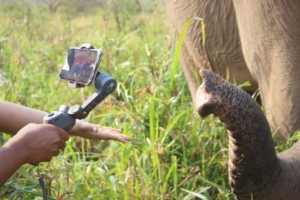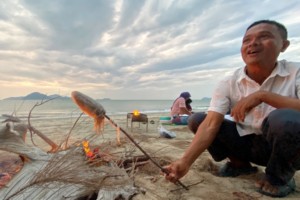A force for good: What can global travel & tourism learn from social enterprises?

Can the local community-based business models of tourism social enterprises be replicated at global scale? Anishka Narula-Nielsen thinks so. It’s her first “Good Tourism” Insight. (You too can write a “GT” Insight.)
- The search for ‘good tourism’
- What makes tourism ‘good’?
- What makes social enterprises different?
- What I learned about tourism social enterprises in Thailand
- What can the travel & tourism industry learn from social enterprises?
- Scaling up: How can global tourism do better?
- Final thought: The power of choice
- What do you think?
- About the author
- Featured image (top of post)
The search for ‘good tourism’
Tourism is one of the most powerful forces in the world. It drives economies, creates jobs, and introduces us to new cultures. But we also know that not all tourism is ‘good tourism’.
For years, we’ve seen the same cycle repeat itself: destinations get popular, tourism booms, and before long local communities are priced out, culture is commodified, and the environment takes a hit.
Meanwhile, most of the profits don’t even stay in the destination, they instead flow to large corporations, foreign-owned resorts, and international booking platforms, leaving local people with the smallest share of the profits and the biggest share of the burden.
What makes tourism ‘good’?
It’s not just about eco-friendly hotels and sustainability-related buzzwords. Good tourism actively benefits the people and places that make travel possible. And I would argue that one of the most effective ways to achieve this is social enterprise.
The social enterprise business model, which combines profit with purpose, is quietly transforming the tourism industry. Social enterprises in tourism are often overlooked, yet they play a vital role in making the sector more inclusive, ethical, and sustainable.
During my doctoral studies, I focused on researching social enterprises in Thailand and found that tourism social enterprises are drivers of sustainable tourism development because they:
- Prioritise purpose over profit: Social value creation is at their core.
- Empower local communities: Unlike private-sector businesses, social enterprises involve local voices in decision-making.
- Embed sustainability: Responsible practices are fundamental to their operations, not an afterthought.
Social enterprises are more than just ethical businesses. They redefine what ‘success’ looks like in tourism. My research found that well-run tourism social enterprises contribute to:
- Job creation for marginalised groups;
- Local economic development through sustainable supply chains; and
- The preservation of cultural heritage by reinvesting in communities.
In this “Good Tourism” Insight I explore why I believe this approach represents one of the most promising solutions for the future of good tourism.
What makes social enterprises different?
Most tourism businesses adhere to a familiar formula: maximise profits and minimise costs.
Social enterprises rewrite the script. They operate with a dual mission: profit and purpose. They are self-sustaining businesses that reinvest a significant portion of their earnings into social and environmental causes.
Unlike traditional businesses that often extract value from communities, social enterprises embed community-driven impact into their business models, ensuring that tourism actively contributes to local well-being rather than displacing or exploiting communities.
What I learned about tourism social enterprises in Thailand
In Thailand, where I conducted my research, many social entrepreneurs are deeply influenced by Buddhist values and King Bhumibol Adulyadej’s ‘Sufficiency Economy Philosophy’, which emphasises moderation, resilience, and long-term sustainability. This cultural foundation makes Thai social enterprises unique, but the principles they follow apply globally.
The values of Thailand’s Sufficiency Economy Philosophy shape business models that prioritise fair wages, local investment, and long-term sustainability over short-term profits.
What does this look like in practice?
- A community-run guesthouse that channels profits into local education and health.
- An eco-tour company that funds local conservation efforts through visitor fees.
- A restaurant that offers on-the-job paid training to local marginalised youth, providing them with career opportunities.
Specific examples, such as HiveSters in Bangkok and Andaman Discoveries in Phang Nga, southern Thailand, demonstrate how community-led tourism can offer high-quality visitor experiences while putting locals in the driver’s seat.
- HiveSters partners with seniors in the community to offer authentic cultural experiences such as Thai dessert-making classes, providing income to ageing women who might otherwise be excluded from the workforce.
- Andaman Discoveries works with communities affected by the 2004 tsunami, offering homestays, local guide training, and conservation-focused tourism that helps restore both ecosystems and livelihoods.
These models show how tourism can uplift communities. And, rather than relying on outside funding, these businesses sustain themselves while creating lasting, meaningful change.
What can the travel & tourism industry learn from social enterprises?
While social enterprises are still a niche within tourism, they offer valuable lessons that mainstream tourism should adopt.
Keep money in local hands
One of the biggest issues in tourism is economic leakage; when much of the money tourists spend leaks out of the destination and fails to benefit the local economy. Social enterprises address this by prioritising local ownership and reinvesting profits back into the destination. Before booking a hotel or tour operator for yourself or your customers, ask: Who owns this business? Where does my money actually go?
Move beyond ‘feel-good’ sustainability
A hotel with solar panels and bamboo straws isn’t automatically an example of ‘good tourism’. Too many companies market and sell sustainability rather than practise it. Look beyond greenwashing. Is their impact documented? Do they share how they give back? Social enterprises make their purpose clear and reinvest much of their profits to it.
Recognise that sustainability is about people, too
When we talk about sustainability in tourism, the focus is often on the environment. But what about the people? Social enterprises understand that sustainability means fair wages, cultural preservation, and long-term economic stability for all involved in the production and delivery of whatever it is they sell.
A good tourism business is one that respects its workers, its community, its supply chain, and the environment in which it operates. A trekking company that pays its guides fairly is as sustainable as an eco-lodge reducing its plastic waste. And surely, both of those businesses, and the industry as a whole, can strive to do both, ensuring tourism is both environmentally and socially responsible.
Scaling up: How can global tourism do better?
The good news? Social enterprises prove that tourism can be both profitable and ethical. But to make these principles mainstream, bigger changes need to happen.
- Governments must learn to prioritise local businesses over large-scale investors who extract more than they give back.
- Travellers need to be even more intentional; choosing businesses that reinvest in host communities and destinations.
- Industry stakeholders — hotels, airlines, tour operators, etc — should integrate social enterprises into their supply chains.
- Destination management organisations and tourism boards also have a role to play by supporting social enterprises with capacity-building, visibility, and procurement.
Tourism has the potential to be one of the world’s greatest tools for economic empowerment and cultural preservation, but only if we actively design it that way.
Final thought: The power of choice
If tourism is to be a force for good now and in the future, then everyone in tourism should embrace business models that balance economic and environmental sustainability with social well-being, making destinations more resilient, ethical, and community-focused.
Good tourism isn’t about sacrificing comfort or fun. You don’t have to spend your trip volunteering or hiking barefoot for it to be meaningful. It’s simply about choosing wisely.
Whether booking a hotel, a tour, or a meal, consider:
- Who benefits from my spending?
- Are staff paid fairly and treated with respect?
- Is this business reinvesting in its community?
- Does the business source locally and partner with local initiatives?
- Can I find transparent information about their impact?
- Is the destination better now than when I found it?
Tourism should be a force for good, not just for profit. And by making conscious choices, every traveller and link in the supply chain has the power to make tourism truly good.
What do you think?
Share your own thoughts about social enterprises and tourism’s potential to be a force for good in a comment below.
(SIGN IN or REGISTER first. After signing in you will need to refresh this page to see the comments section.)
Or write a “GT” Insight or “GT” Insight Bite of your own. The “Good Tourism” Blog welcomes diversity of opinion and perspective about travel & tourism, because travel & tourism is everyone’s business.
“GT” doesn’t judge. “GT” publishes. “GT” is where free thought travels.
If you think the tourism media landscape is better with “GT” in it, then please …
About the author

Anishka Narula-Nielsen is a tourism consultant and researcher specialising in social enterprises’ role in sustainable tourism development.
Committed to “shaping a tourism industry that prioritises people, place, and purpose”, Dr Narula-Nielsen recently founded Roots and Routes Consulting, which helps tourism and hospitality businesses “refine their strategies for long-term success and sustainability”.
Passionate about “creating meaningful impact”, Anishka provides “strategic insights that enhance guest experiences, streamline operations, and integrate responsible tourism practices”.
She is based in London, UK.
Featured image (top of post)
A force for good: What can global travel & tourism learn from social enterprises? A Gemini-generated image.





